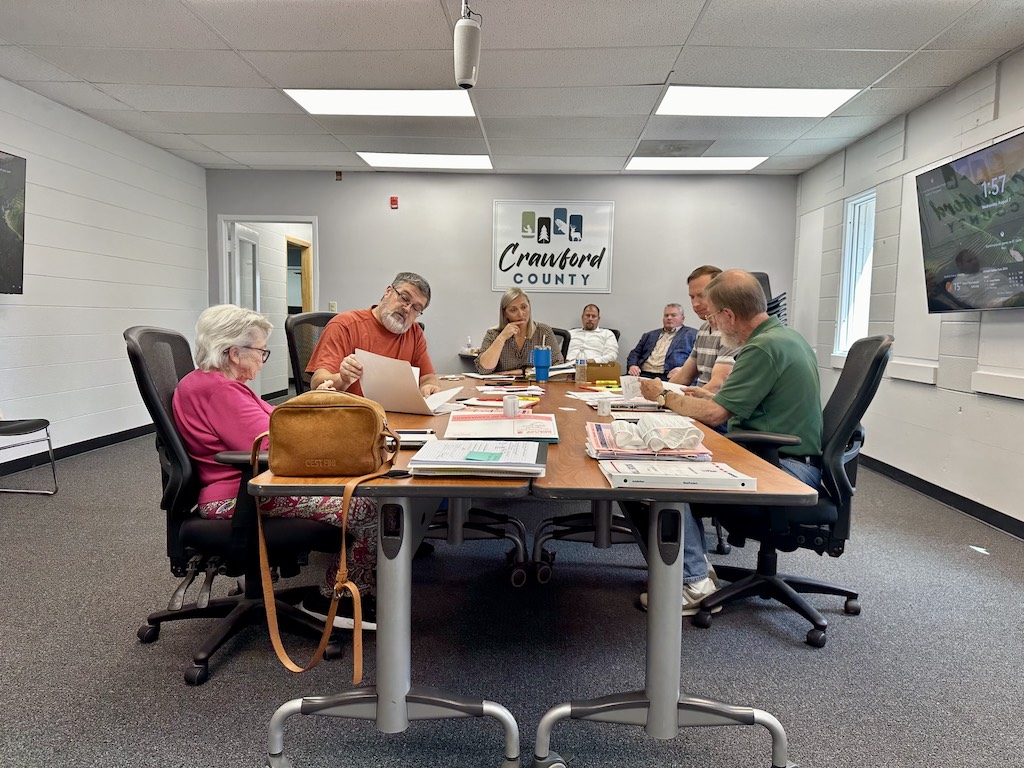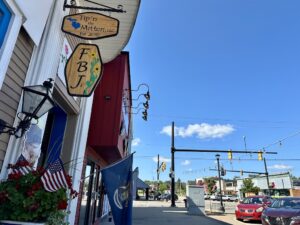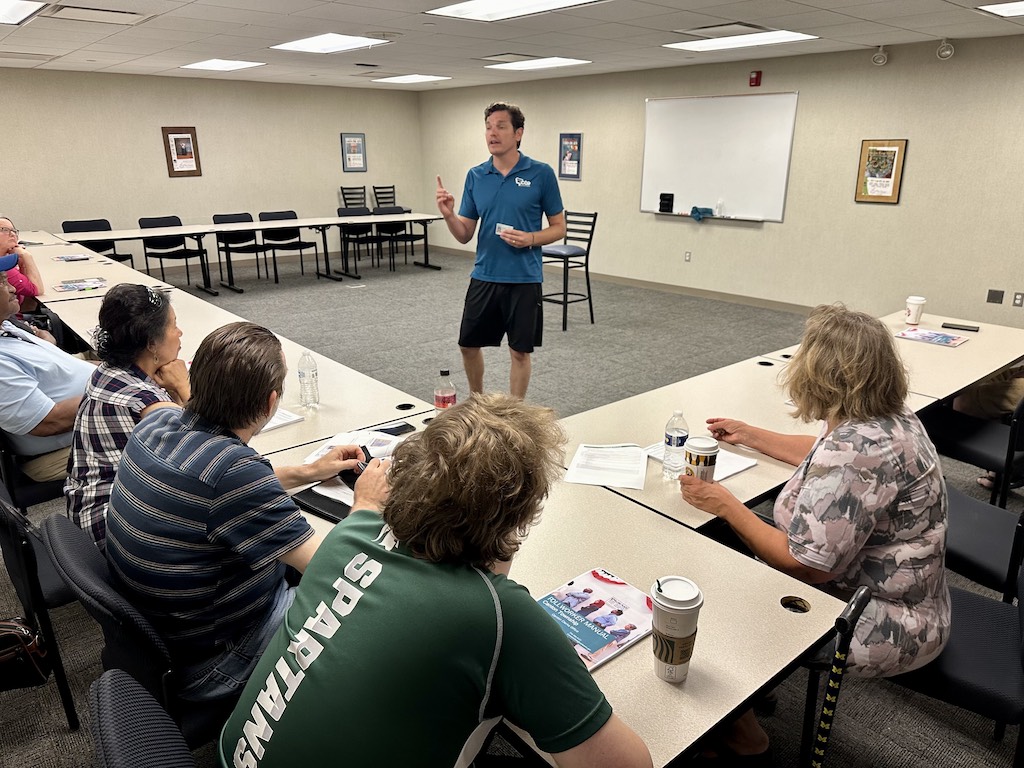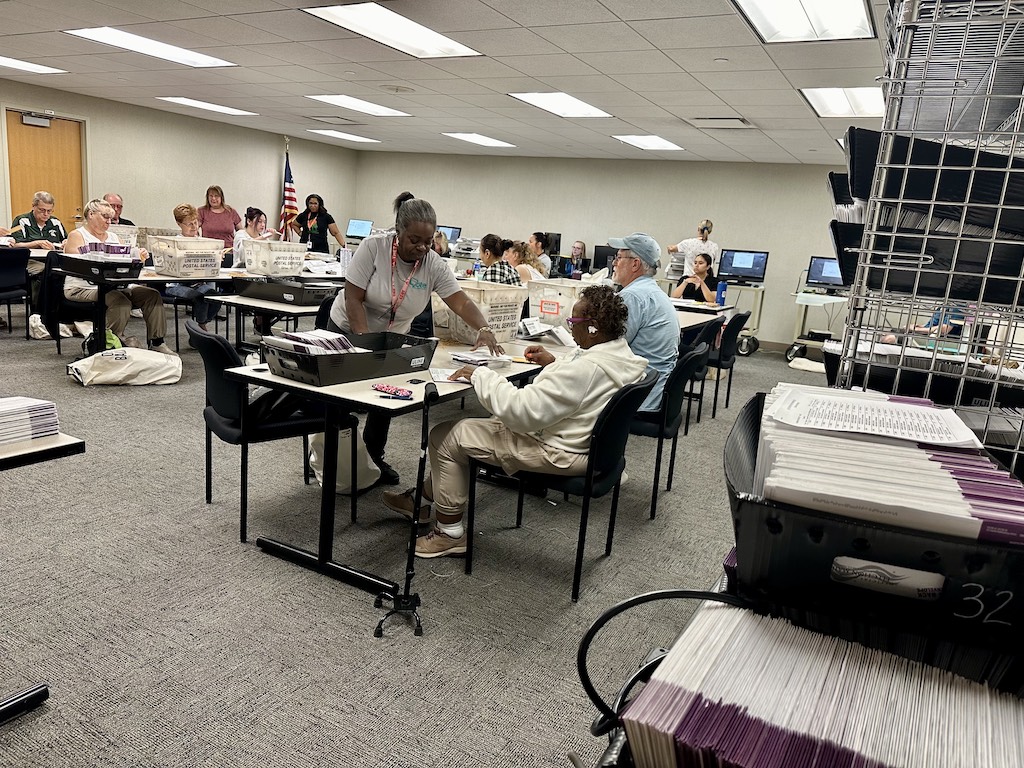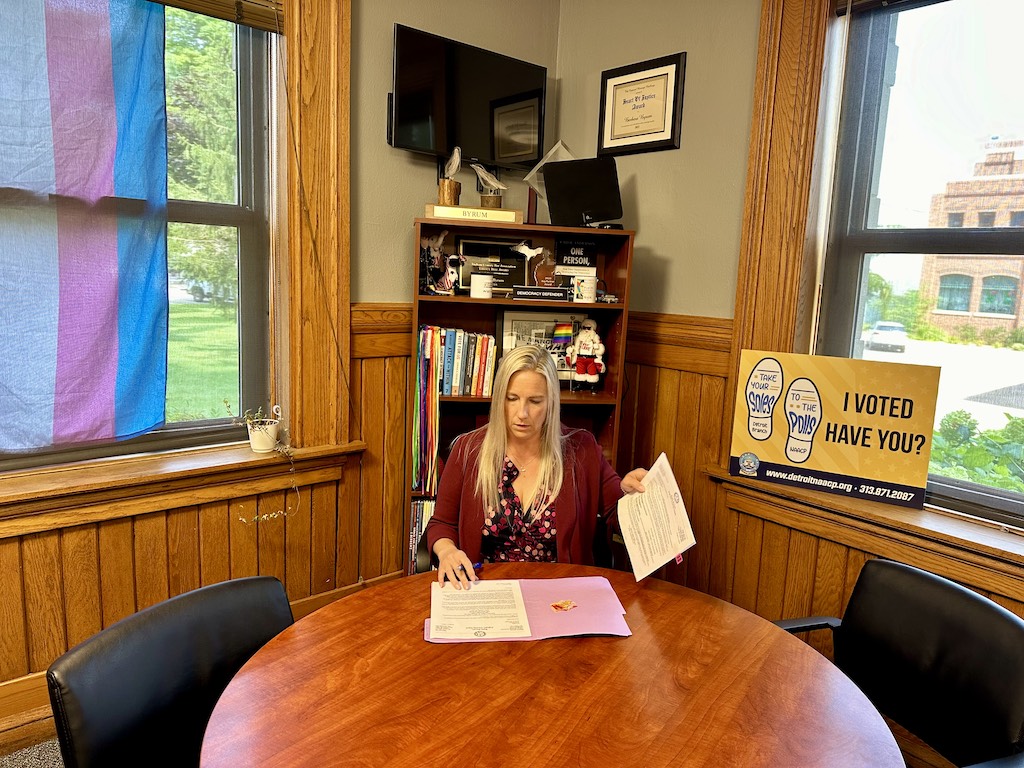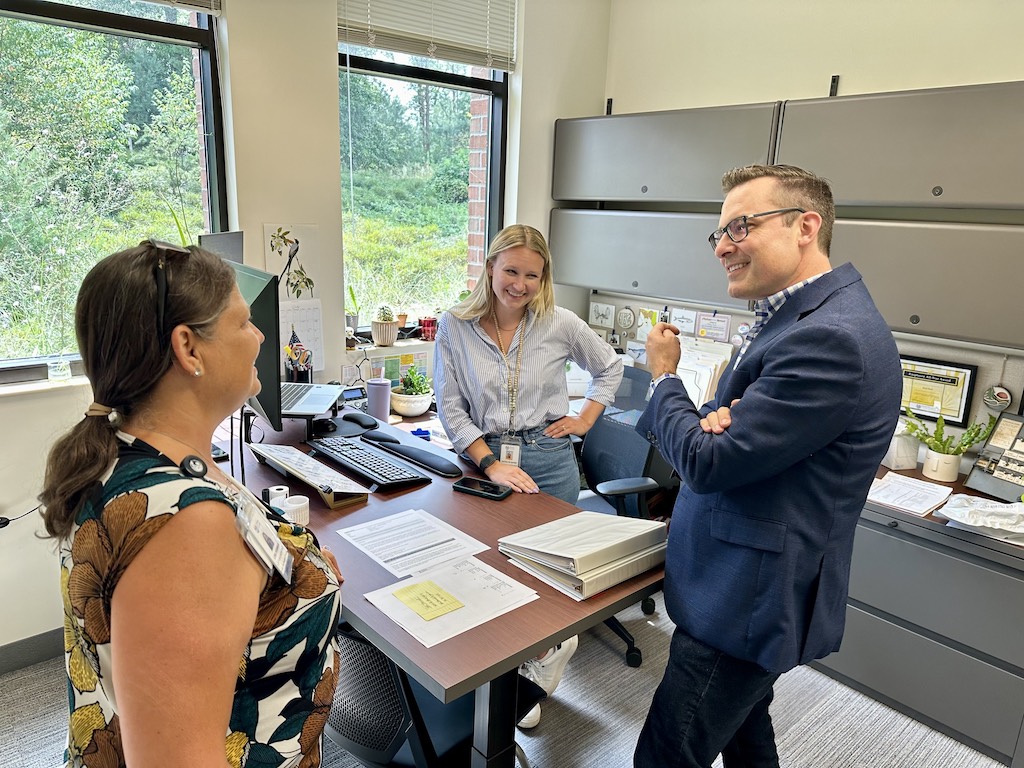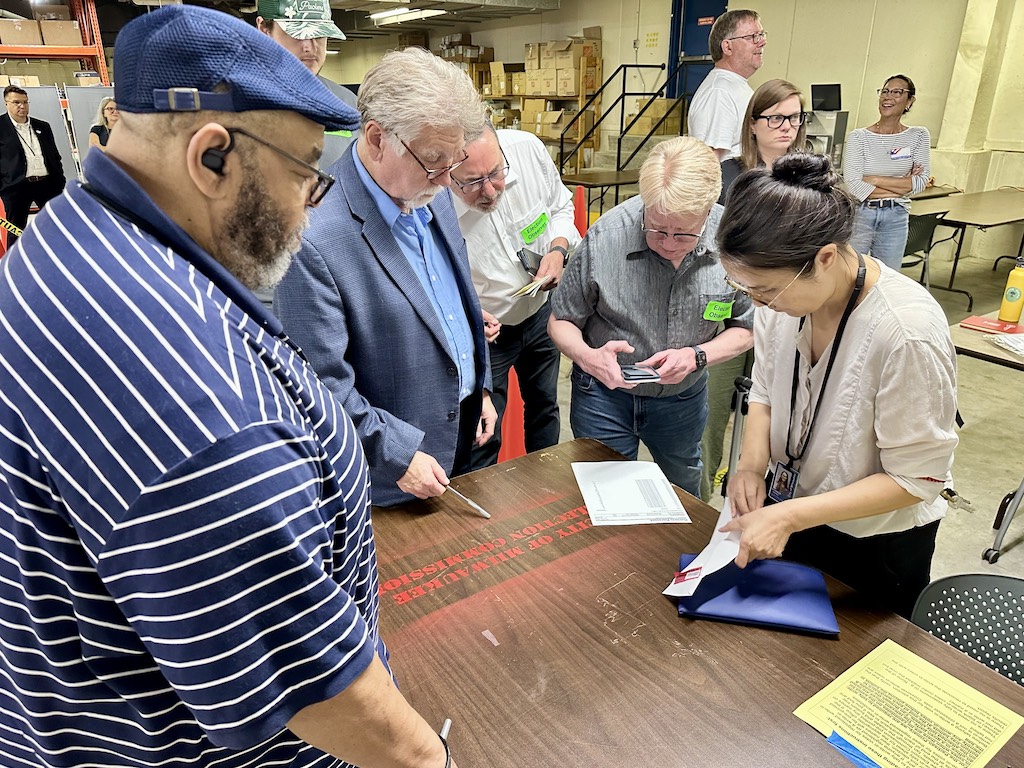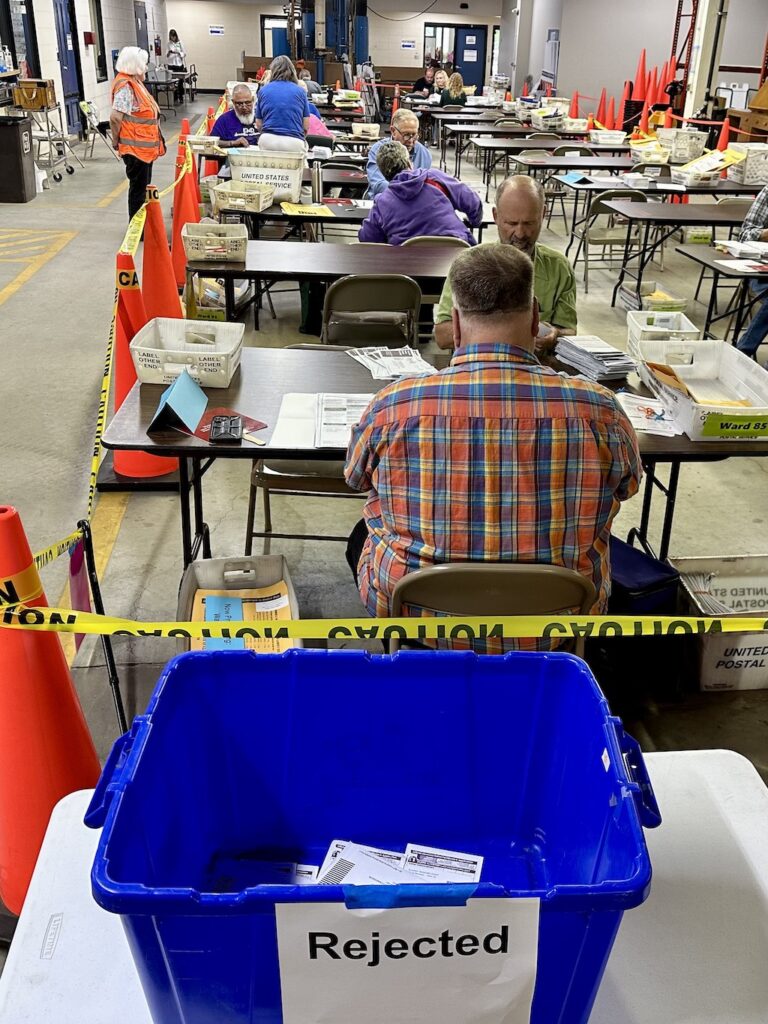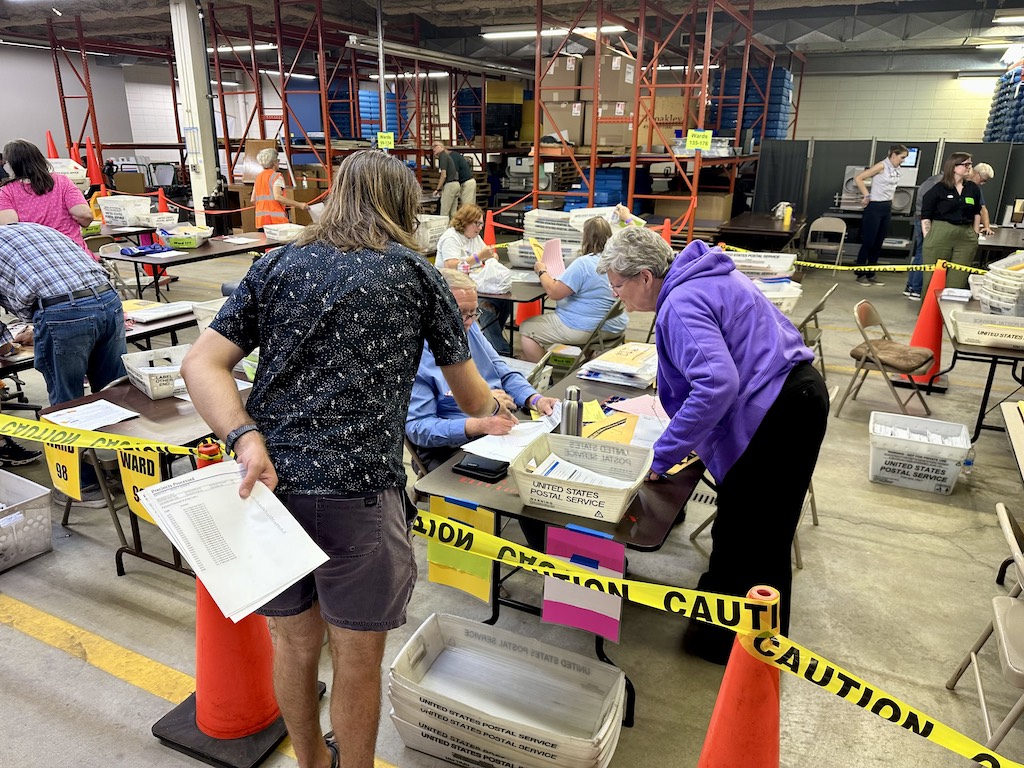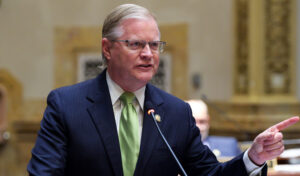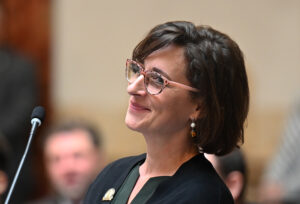Gov. Andy Beshear has tried to appeal to his own reputation for transparency to explain his apparent support for a bill that would reduce the public's access to records of official government business. (Photo by Arden Barnes)
This article has been updated with information from the most recent campaign finance reports filed last week.
?FRANKFORT, Ky. – Gov. Andy Beshear and the Kentucky Democratic Party held a big early fundraising lead over Republicans at the outset of this year when Beshear stands for reelection.
Beshear’s campaign manager Eric Hyers said that, because Beshear has been an effective leader who has brought tens of thousands of jobs and billions in investment to the state, “thousands of Kentuckians have contributed to his reelection.”
Thousands have contributed. But who are the people, and groups of people, who contributed the most to fill that brimming war chest?
The law requires names of donors, and amounts they gave, be disclosed to the Federal Election Commission or Kentucky Registry of Election Finance and posted on those websites for anyone to see.
But the websites provide limited transparency for anyone trying to find groups of donors that bundled batches of contributions, or find unusual patterns of donations. Listings of online donors are very long, and the websites of the FEC and KREF can be confusing to navigate.
In an effort to enhance transparency, Kentucky Lantern decided to make its best effort at analyzing those contributions. Specifically, the analysis looked at nearly 10,000 itemized contributions totaling about $5 million to the Beshear campaign from Oct. 1, 2021 through Dec. 31, 2022, and it reviewed about 5,700 contributions totaling nearly $10 million to the Kentucky Democratic Party between Nov. 5, 2019 and Feb. 28, 2023.
The process began by focusing on the largest individual donors to the Kentucky Democratic Party who also gave to the Beshear campaign. We looked at names, addresses, employers of donors, and the dates the contributions were made. We searched the internet for further information about the largest donors. Political MoneyLine and Open Secrets, two online databases of political contributions were invaluable to the research, as were the online corporate records of the Kentucky secretary of state.
Such an analysis may not necessarily produce a definitive list of the largest bundles of donors. That may not be possible without talking to thousands of donors. But contacting donors often does not shed much light. Messages left with officials of some large donating groups listed below (Swartz Enterprises, HealthTech Solutions, Morgan Collins Yeast & Salyer, Churchill Downs, Kentucky Downs) were not returned.
William May, of Hurt Deckard & May, declined to comment on the contributions he and his colleagues made.
Jonathan Rabinowitz, a partner with the Morgan and Morgan law firm, declined an interview, but released a statement that said, “Governor Beshear is a longtime friend of myself and many people in our office, with some having known him since high school. We’re incredibly proud to support him.”
(Yet, of the 54 lawyers with Morgan & Morgan who contributed, 34 of them live outside Kentucky.)
The analysis came to the surprising conclusion that the biggest group of contributions came from persons associated with WB Transport of London and its cofounder London Mayor Randall Weddle, though Weddle himself did not contribute.
But there were many other big bundles. The bundling of contributions is a common practice in big campaigns and is legal so long as the donor is voluntarily donating his or her own money.
Below are two listings. First is a list of the largest bundles of contributions from particular groups — officials and employees of a business, along with their immediate relatives and close associates.
Second is a list of individuals who reports show gave the most to the Kentucky Democratic Party and Beshear campaign over the period examined.
Groups
Groups:
Swartz family, Clark and Bath counties: $203,000
Owners of Swartz Enterprises and Swartz Construction, mowing contractors for Transportation Cabinet
Mark Swartz, Winchester, Swartz Enterprises????????????????????? $15,000 to KDP on 12-30-22
Mark Swartz, Winchester, Swartz Enterprises????????????????????? $2,000 to Beshear campaign on 6-28-22
Mark Swartz, Winchester, Swartz Enterprises????????????????????? $15,000 to KDP on 9-29-21
Mark Swartz, Winchester, Swartz Enterprises????????????????????? $15,000 to KDP on 8-28-20
Colleen Swartz, Winchester, UK Medical Center???????????????? $15,000 to KDP on 12-30-22
Colleen Swartz, Winchester, UK Medical Center???????????????? $2,000 to Beshear campaign on 6-28-22
Colleen Swartz, Winchester, UK Medical center????????????????? $15,000 to KDP on 9-29-21
Colleen Swartz, Winchester, UK Medical Center???????????????? $15,000 to KDP on 8-28-20
Mike Swartz, Olympia, Swartz Construction????????????????????????? $15,000 to KDP on 12-30-22
Mike Swartz, Olympia, Swartz Construction????????????????????????? $2,000 to Beshear campaign on 6-28-22
Mike Swartz, Olympia, Swartz Construction????????????????????????? $15,000 to KDP on 9-29-21
Mike Swartz, Olympia, Swartz Construction????????????????????????? $15,000 to KDP on 8-28-20
Carson Swartz, Winchester, nurse??????????????????????????????????????????? $2,000 to Beshear campaign on 6-28-22
Emery Swartz, Winchester, retired?????????????????????????????????????????? $2,000 to Beshear campaign on 6-28-22
Peggy Swartz, Olympia, Gateway Health Dept???????????????????? $2,000 to Beshear campaign on 6-28-22
Caitlin Sadler, Sharpsburg, teacher?????????????????????????????????????????? $2,000 to Beshear campaign on 6-28-22
Caitlin Sadler, Sharpsburg, Ky Beef Council??????????????????????????? $15,000 to KDP on 9-29-21
James Sadler, Sharpsburg, Delta Gas customer rep??????????? $2,000 to Beshear campaign on 6-28-22
Kurt Wlihelmus, Nicholasville, student??????????????????????????????????? $2,000 to Beshear campaign on 6-28-22
Derek Fisher, Olympia, Swartz Construction, mechanic??? $1,000 to Beshear campaign on 6-28-22
Laveda Motley, Olympia, Swartz Construction???????????????????? $2,000 to Beshear campaign on 6-28-22
Laveda Motley, Olympia, homemaker???????????????????????????????????? $15,000 to KDP on 12-30-22
Laveda Motley, Olympia, homemaker???????????????????????????????????? $15,000 to KDP on 8-28-20
Richard Motley, Salt Lick, retired?????????????????????????????????????????????? $2,000 to Beshear campaign on 6-28-22
Morgan, Collins, Yeast & Salyer, London???????????????????????????? $199,000
Law firm handles many personal injury and workers’ compensation cases
McKinnley Morgan, London???????????????????????????????????????????????????????? $15,000 to KDP on 6-30-22
McKinnley Morgan, London???????????????????????????????????????????????????????? $2,000 to Beshear campaign on 12-13-21
McKinnley Morgan, London???????????????????????????????????????????????????????? $15,000 to KDP on 4-30-21
McKinnley Morgan, London???????????????????????????????????????????????????????? $5,000 to KDP on 10-16-20
McKinnley Morgan, London???????????????????????????????????????????????????????? $10,000 to KDP on 7-27-20
Jennifer Collins, Manchester?????????????????????????????????????????????????????? $2,000 to Beshear campaign on 12-29-21
Jennifer Collins, Manchester?????????????????????????????????????????????????????? $10,000 to KDP on 12-28-22
Jennifer Collins, Manchester?????????????????????????????????????????????????????? $5,000 to KDP on 12-8-21
Jennifer Collins, Manchester?????????????????????????????????????????????????????? $10,000 to KDP on 8-27-21
Jennifer Collins, Manchester?????????????????????????????????????????????????????? $10,000 to KDP on 10-16-20
Dan Yeast, Nancy???????????????????????????????????????????????????????????????????????????? $10,000 to KDP on 12-28-22
Dan Yeast, Nancy???????????????????????????????????????????????????????????????????????????? $2,000 to Beshear campaign on 12-29-21
Dan Yeast, Nancy???????????????????????????????????????????????????????????????????????????? $15,000 to KDP on 12-21-21
Kyle Salyer, Staffordsville???????????????????????????????????????????????????????????? $10,000 to KDP on 12-28-22
Kyle Salyer, Staffordsville???????????????????????????????????????????????????????????? $5,000 to KDP on 9-20-22
Kyle Salyer, Staffordsville???????????????????????????????????????????????????????????? $2,000 to Beshear campaign on 12-29-21
Kyle Salyer, Staffordsville???????????????????????????????????????????????????????????? $15,000 to KDP on 12-21-21
Kyle Salyer, Staffordsville???????????????????????????????????????????????????????????? $10,000 to KDP on 10-29-20
Gerald Vanover Jr., London????????????????????????????????????????????????????????? $2,000 to Beshear campaign on 12-29-21
Gerald Vanover Jr., London????????????????????????????????????????????????????????? $15,000 to KDP on 12-21-21
Gerald Vanover Jr., London????????????????????????????????????????????????????????? $5,000 to KDP on 10-16-20
Bruce Bentley, London????????????????????????????????????????????????????????????????? $5,000 to KDP on 12-31-22
Bruce Bentley, London????????????????????????????????????????????????????????????????? $2,000 to Beshear campaign on 12-29-21
Bruce Bentley, London????????????????????????????????????????????????????????????????? $13,000 to KDP on 12-21-21
Kelly Bentley, London, homemaker????????????????????????????????????????? $2,000 to Beshear campaign on 12-29-21
Wanda Morgan, London, retired?????????????????????????????????????????????? $2,000 to Beshear campaign on 3-22-22
Kentucky Downs, Simpson County?????????????????????????????????????? $195,500
Historical horse racing venue and horse race track
Ron Winchell, Las Vegas, Winchell Thoroughbreds??????????? $2,000 to Beshear campaign on 3-28-22
Ron Winchell, Las Vegas, ECL Entertainment??????????????????????? $15,000 to KDP on 7-21-20
Ron Winchell, Las Vegas, ECL Entertainment??????????????????????? $10,000 to KDP on 11-20-19
Kristen Winchell, Las Vegas, ECL??????????????????????????????????????????????? $15,000 to KDP on 12-27-22
Kristen Winchell, Las Vegas, ?????????????????????????????????????????????????????? $10,000 to KDP on 10-29-20
Joan Winchell, Las Vegas,???????????????????????????????????????????????????????????? $15,000 to KDP on 12-19-22
Joan Winchell, Las Vegas, investor??????????????????????????????????????????? $10,000 to KDP on 4-23-21
Marc Falcone, Las Vegas, ECL????????????????????????????????????????????????????? $2,000 to Beshear campaign on 3-29-22
Marc Falcone, Franklin, KY, business owner????????????????????????? $15,000 to KDP on 8-11-20
Marc Falcone, Franklin, KY, business owner????????????????????????? $10,000 to KDP on 11-20-19
Allan Creek, Las Vegas, Fenske Media???????????????????????????????????? $2,000 to Beshear campaign on 3-30-22
Allan Creel, Las Vegas, ACHC LLC??????????????????????????????????????????????? $15,000 to KDP on 7-27-20
Allan Creel, Las Vegas, ACHC LLC??????????????????????????????????????????????? $10,000 to KDP on 11-20-19
Kristine Creel, Las Vegas, retired?????????????????????????????????????????????????????????????? $2,000 to Beshear campaign on 3-30-22
Kristine Creel, Las Vegas ?????????????????????????????????????????????????????????????? $10,000 to KDP on 11-20-19
Jennifer Schacht, Las Vegas, Light Group??????????????????????????????? $15,000 to KDP on 12-29-22
Jennifer Schacht, Las Vegas???????????????????????????????????????????????????????? $10,000 to KDP on 4-5-21
Jennifer Schacht, Las Vegas,??????????????????????????????????????????????????????? $10,000 to KDP on 10-31-20
Gilbert Macagno, Las Vegas, Carlton Group????????????????????????? $15,000 to KDP on 4-23-21
Robert Browning, Las Vegas, ECL Development????????????????? $2,000 to Beshear campaign on 3-29-22
David Fiske, Lexington, Winchell Thoroughbreds??????????????? $500 to Beshear campaign on 10-1-21
Hurt Deckard & May, Lexington?????????????????????????????????????????????????????? $183,000
Law firm and lobbying firm
William C. Hurt Jr., Lexington, ??????????????????????????????????? $15,000 to KDP on 9-20-22
William C. Hurt Jr., Lexington????????????????????????????????????? $2,000 to Beshear campaign on 11-29-21
William C. Hurt Jr., Lexington????????????????????????????????????? $15,000 to KDP on 9-30-21
William C. Hurt Jr., Lexington????????????????????????????????????? $5,000 to KDP on 9-10-20
Susan Hurt, Lexington??????????????????????????????????????????????????? $2,000 to Beshear campaign on 11-29-21
Susan Hurt, Lexington??????????????????????????????????????????????????? $10,000 to KDP on 9-20-22
Mandy Deckard, Lexington nurse????????????????????????????? $15,000 to KDP on 9-20-22
Mandy Deckard, Lexington????????????????????????????????????????? $2,000 to Beshear campaign on 11-29-21
Mandy Deckard, Lexington????????????????????????????????????????? $15,000 to KDP on 9-29-21
William H. May III, Lexington?????????????????????????????????????? $15,000 to KDP on 9-20-22
William H. May III, Lexington?????????????????????????????????????? $15,000 to KDP on 9-29-21
William H. May III, Lexington?????????????????????????????????????? $2,000 to Beshear campaign on 11-29-21
William H. May III, Lexington?????????????????????????????????????? $5,000 to KDP on 9-10-20
William H. May III, Lexington?????????????????????????????????????? $2,500 to KDP on 2-27-20
Denise May, Frankfort????????????????????? $2,000 to Beshear campaign on 11-29-21
Denise May, Frankfort????????????????????? $10,000 to KDP on 9-29-21
Matthew Malone, Lexington?????????????????????????????????????? $5,000 to KDP on 9-20-22
Matthew Malone, Lexington?????????????????????????????????????? $2,000 to Beshear campaign on 12-17-21
Matthew Malone, Lexington?????????????????????????????????????? $2,500 to KDP on 9-29-21
Matthew Malone, Lexington?????????????????????????????????????? $5,000 to KDP on 9-10-20
Emily Malone, Lexington????????????????????????????????????????????? $2,000 to Beshear campaign on 12-17-21
Aaron Reedy????????????????????????????????????????????????????????????????????? $5,000 to KDP on 9-20-22
Aaron Reedy????????????????????????????????????????????????????????????????????? $2,500 to KDP on 9-29-21
Michael Kalinyak, Paris?????????????????????????????????????????????????? $2,000 to Beshear campaign on 11-29-21
Sannie Overly, Paris???????????????????????????????????????????????????????? $15,000 to KDP on 9-20-22
Sannie Overly, Paris???????????????????????????????????????????????????????? $2,000 to Beshear campaign on 1-27-22
Sannie Overly, Paris???????????????????????????????????????????????????????? $7,500 to KDP on 9-29-21
HealthTech Solutions, Frankfort?????????????????????????????????????????????????????????????????????????????? $159,250
Health information technology firm co-founded by former Cabinet for Health and Family Services official Frank Lassiter
Franklin Lassiter, Midway???????????????????????????????????????????????????????????? $15,000 to KDP on 12-15-22
Franklin Lassiter, Midway???????????????????????????????????????????????????????????? $2,000 to Beshear campaign on 6-28-22
Franklin Lassiter, Midway???????????????????????????????????????????????????????????? $15,000 to KDP on 11-2-21
Franklin Lassiter, Midway???????????????????????????????????????????????????????????? $15,000 to KDP on 10-28-20
Mary Lassiter, Midway?????????????????????????????????????????????????????????????????? $15,000 to KDP on 12-15-22
Mary Lassiter, Midway?????????????????????????????????? ??????????????????????????????? $2,000 to Beshear campaign on 6-28-22
Mary Lassiter, Midway?????????????????????????????????????????????????????????????????? $15,000 to KDP on 11-2-21
Mary Lassiter, Midway?????????????????????????????????????????????????????????????????? $15,000 to KDP on 10-28-20
Mary E. Niehaus, Falcon Heights, MN????????????????????????????????????? $15,000 to KDP on 12-28-22
Mary E. Niehaus, Falcon Heights, MN????????????????????????????????????? $2,000 to Beshear campaign on 6-28-22
Mary E. Niehaus, Falcon Heights, MN????????????????????????????????????? $10,000 to KDP on 12-21-21
Thomas Niehaus, Falcon Heights, MN????????????????????????????????????? $2,000 to Beshear campaign on 6-28-22
Ben Lassiter, Lexington????????????????????????????????????????????????????????????????? $15,000 to KDP on 12-21-21
George B. Lassiter, Lexington????????????????????????????????????????????????????? $15,000 to KDP on 12-15-22
George B. Lassiter, Lexington????????????????????????????????????????????????????? $2,000 to Beshear campaign on 6-28-22
Sandeep Kapoor,???????????????????????????????????????????????????????????????????????????? $2,000 to Beshear campaign on 6-30-22
Gargi Kapoor,??????????????????????????????????????????????????????????????????????????????????? $2,000 to Beshear campaign on 6-30-22
Bettina Rice, Lexington????????????????????????????????????????????????????????????????? $250 to KDP on 10-8-21
Morgan & Morgan, Orlando Florida???????????????????????????????????? $156,050
National personal injury law firm that has big presence in Kentucky
Jonathan Rabinowitz, Versailles???????????????????????????????? $100 to Beshear campaign on 1-16-23
Jonathan Rabinowitz, Versailles???????????????????????????????? $15,000 to KDP on 1-16-23
Jonathan Rabinowitz, Versailles???????????????????????????????? $15,000 to KDP on 7-18-20
Jonathan Rabinowitz, Versailles???????????????????????????????? $2,000 to Beshear campaign on 2-10-22
Kathleen Rabinowitz, Versailles???????????????????????????????? $100 to Beshear campaign on 1-16-23
Kathleen Rabinowitz, Versailles ?????????????????????????????? $2,000 to Beshear campaign on 2-10-22
Michael Morgan, Orlando, FL????????????????????????????????????? $15,000 to KDP on 8-18-22
Michael Morgan, Orlando, FL????????????????????????????????????? $2,000 to Beshear campaign on 8-18-22
Michael Morgan, Orlando, FL????????????????????????????????????? $15,000 to KDP on 7-18-20
Reuven Moskowitz, Lawrence, New York?????????????? $15,000 to KDP on 9-14-22
Reuven Moskowitz. Lawrence, New York?????????????? $2,000 to Beshear campaign on 9-14-22
Reuven Moskowitz, Lawrence, New York?????????????? $15,000 to KDP on 8-28-20
Jason Miller, Jacksonville, FL??????????????????????????????????????? $5,000 to KDP on 8-26-22
Jason Miller, Jacksonville, FL??????????????????????????????????????? $2,000 to Beshear campaign on 8-26-22
Tanner Shultz, Lexington????????????????????????????????????????????? $1,000 to Beshear campaign on 9-29-22
Tanner Shultz, Lexington????????????????????????????????????????????? $1,000 to Beshear campaign on 8-18-22
Greg Stumbo, Prestonsburg??????????????????????????????????????? $2,000 to Beshear campaign on 6-20-22
Kelli Lester, Bowling Green????????????????????????????????????????? $2,000 to Beshear campaign on 9-29-22
Zachary Chesser, Lexington???????????????????????????????????????? $200 to Beshear campaign on 9-29-22
Brenton Stanley, Louisville?????????????????????????????????????????? $500 to Beshear campaign on 9-29-22
Kaleigh Yurkew, Louisville???????????????????????????????????????????? $150 to Beshear campaign on 9-29-22
Joseph Rugg, Lexington???????????????????????????????????????????????? $2,000 to Beshear campaign on 9-29-22
Alan Borowsky, Bala Cynwyd, PA?????????????????????????????? $150 to Beshear campaign on 9-29-22
Scott Wallitsch, Louisville????????????????????????????????????????????? $500 to Beshear campaign on 9-29-22
Danielle Blandford, Louisville????????????????????????????????????? $500 to Beshear campaign on 9-29-22
Dion Moorman, Owensboro?????????????????????????????????????? $1,000 to Beshear campaign on 9-28-22
Thomas Chumbley, Louisville????????????????????????????????????? $200 to Beshear campaign on 9-28-22
David Dufour, Louisville???????????????????????????????????????????????? $2,000 to Beshear campaign on 9-27-22
Lauren Marley, Bowling Green?????????????????????????????????? $2,000 to Beshear campaign on 9-27-22
Sara Cowles, Bowling Green??????????????????????????????????????? $500 to Beshear campaign on 9-27-22
Austin Raboin, Belleville, IL?????????????????????????????????????????? $200 to Beshear campaign on 9-26-22
Michael Goetz, Tampa, FL???????????????????????????????????????????? $1,000 to Beshear campaign on 9-23-22
Alexander Wolff, St. Louis, MO?????????????????????????????????? $500 to Beshear campaign on 9-22-22
John Spies, Louisville?????????????????????????????????????????????????????? $250 to Beshear campaign on 8-19-22
Benjamin Adams, Charleston, WV???????????????????????????? $250 to Beshear campaign on 9-15-22
Carmen Clem, Orlando, FL??????????????????????????????????????????? $2,000 to Beshear campaign on 9-15-22
Jonathan Sedgh, Great Neck, NY??????????????????????????????? $500 to Beshear campaign on 9-13-22
Jonathan Sedgh, Great Neck, NY??????????????????????????????? $500 to Beshear campaign on 8-23-22
Blake Nolan, Lexington????????????????????????????????????????????????? $1,000 to Beshear campaign on 9-12-22
Greg Vescoco, Richmond Heights, MO??????????????????? $250 to Beshear campaign on 9-12-22
Robert Wilkins, Jackson, MS??????????????????????????????????????? $1,000 to Beshear campaign on 9-12-22
Rene Rocha, New Orleans, LA???????????????????????????????????? $500 to Beshear campaign on 9-12-22
Clancy Boylan, Philadelphia, PA????????????????????????????????? $2,000 to Beshear campaign on 9-12-22
Bryce Spano, Tampa, FL???????????????????????????????????????????????? $1,000 to Beshear campaign on 9-12-22
Luke Mitcheson, Waltham, MA????????????????????????????????? $1,000 to Beshear campaign on 9-12-22
James Moon, Naples, FL??????????????????????????????????????????????? $500 to Beshear campaign on 9-12-22
Garrett Lee, Boston, MA?????????????????????????????????????????????? $1,000 to Beshear campaign on 9-8-22
Scott Whitley, Tampa, FL?????????????????????????????????????????????? $1,000 to Beshear campaign on 9-1-22
William Lewis, West Palm Beach, FL???????????????????????? $1,000 to Beshear campaign on 8-24-22
Blake Lange, Naples, FL????????????????????????????????????????????????? $500 to Beshear campaign on 8-22-22
Ben Wilson, Madison, MS???????????????????????????????????????????? $1,500 to Beshear campaign on 8-19-22
David Noble, Lexington???????????????????????????????????????????????? $2,000 to Beshear campaign on 8-18-22
Jacob Sternberger, Philadelphia, PA???????????????????????? $500 to Beshear campaign on 8-18-22
Tyler Kobylinski, Orlando, FL??????????????????????????????????????? $500 to Beshear campaign on 8-18-22
Matt Morgan, Winter Park, FL???????????????????????????????????? $2,000 to Beshear campaign on 8-18-22
James Young, Jacksonville, FL????????????????????????????????????? $2,000 to Beshear campaign on 8-18-22
Christopher Mossallati, Fort Myers, FL??????????????????? $500 to Beshear campaign on 8-18-22
Adam Brum, Tampa, FL????????????????????????????????????????????????? $200 to Beshear campaign on 8-18-22
Daniel Morgan, Winter Park, FL????????????????????????????????? $2,000 to Beshear campaign on 9-12-22
Josh Autry, Lexington???????????????????????????????????????????????????? $500 to Beshear campaign on 8-18-22
Mark Troy, Charleston, WV????????????????????????????????????????? $2,000 to Beshear campaign on 8-18-22
Sumeet Kaul, Tampa, FL???????????????????????????????????????????????? $1,000 to Beshear campaign on 8-18-22
Ryan Rudd, Orlando, FL????????????????????????????????????????????????? $2,000 to Beshear campaign on 8-18-22
Richard Bates, Orlando, FL??????????????????????????????????????????? $2,000 to Beshear campaign on 8-18-22
Shea Conley, Lexington???????????????????????????????????????????????? $2,000 to Beshear campaign on 8-18-22
Crosby Crane, Tampa, FL?????????????????????????????????????????????? $500 to Beshear campaign on 9-21-22
Churchill Downs, Louisville ? ? ? ? ? ? ? ? ? ? ? ? ? ? ? ? ? ? ? ? ? ? ? $148,000
Race track that also operates historical horse racing venues
William Carstanjen, Prospect? ? ? ? ? ? ? ? ? ? ? ? ? ? ? ? ? ? ? ? ? ? ? ? ? ? ? $2,000 to Beshear campaign on 12-28-22
William Carstanjen, Prospect? ? ? ? ? ? ? ? ? ? ? ? ? ? ? ? ? ? ? ? ? ? ? ? ? ? ? $15,000 to KDP on 12-27-22
William Carstanjen, Prospect? ? ? ? ? ? ? ? ? ? ? ? ? ? ? ? ? ? ? ? ? ? ? ? ? ? ? $15,000 to KDP on 11-10-21
William Carstanjen, Prospect? ? ? ? ? ? ? ? ? ? ? ? ? ? ? ? ? ? ? ? ? ? ? ? ? ? ? $15,000 to KDP on 10-6-20
William Mudd, Louisville ? ? ? ? ? ? ? ? ? ? ? ? ? ? ? ? ? ? ? ? ? ? ? ? ? ? ? ? ? $2,000 to Beshear campaign on 12-28-22
William Mudd, Louisville ? ? ? ? ? ? ? ? ? ? ? ? ? ? ? ? ? ? ? ? ? ? ? ? ? ? ? ? ? $10,000 to KDP on 12-27-22
William Mudd, Louisville ? ? ? ? ? ? ? ? ? ? ? ? ? ? ? ? ? ? ? ? ? ? ? ? ? ? ? ? ? $15,000 to KDP on 11-10-21
William Mudd, Louisville ? ? ? ? ? ? ? ? ? ? ? ? ? ? ? ? ? ? ? ? ? ? ? ? ? ? ? ? ? $5,000 to KDP on 10-6-20
Brad Blackwell, Louisville? ? ? ? ? ? ? ? ? ? ? ? ? ? ? ? ? ? ? ? ? ? ? ? ? ? ? ? ? $1,000 to Beshear campaign on 1-13-23
Brad Blackwell, Louisville? ? ? ? ? ? ? ? ? ? ? ? ? ? ? ? ? ? ? ? ? ? ? ? ? ? ? ? ? $5,000 to KDP on 11-10-21
Brad Blackwell, Louisville? ? ? ? ? ? ? ? ? ? ? ? ? ? ? ? ? ? ? ? ? ? ? ? ? ? ? ? ? $1,500 to KDP on 10-6-20
Austin Miller, Louisville? ? ? ? ? ? ? ? ? ? ? ? ? ? ? ? ? ? ? ? ? ? ? ? ? ? ? ? ? ? ? $5,000 to KDP on 11-10-21
Austin Miller, Louisville? ? ? ? ? ? ? ? ? ? ? ? ? ? ? ? ? ? ? ? ? ? ? ? ? ? ? ? ? ? ? $1,500 to KDP on 10-12-20 92
Benjamin Murr, Louisville ? ? ? ? ? ? ? ? ? ? ? ? ? ? ? ? ? ? ? ? ? ? ? ? ? ? ? ? $1,000 to Beshear campaign on 12-28-22
Benjamin Murr, Louisville ? ? ? ? ? ? ? ? ? ? ? ? ? ? ? ? ? ? ? ? ? ? ? ? ? ? ? ? $2,500 to KDP on 11-20-21
Benjamin Murr, Louisville ? ? ? ? ? ? ? ? ? ? ? ? ? ? ? ? ? ? ? ? ? ? ? ? ? ? ? ? $1,500 to KDP on 10-7-20
Marcia Dall, Prospect ? ? ? ? ? ? ? ? ? ? ? ? ? ? ? ? ? ? ? ? ? ? ? ? ? ? ? ? ? ? ? ? $2,000 to Beshear campaign on 12-28-22
Marcia Dall, Prospect ? ? ? ? ? ? ? ? ? ? ? ? ? ? ? ? ? ? ? ? ? ? ? ? ? ? ? ? ? ? ? ? $3,000 to KDP on 12-27-22
Marcia Dall, Prospect ? ? ? ? ? ? ? ? ? ? ? ? ? ? ? ? ? ? ? ? ? ? ? ? ? ? ? ? ? ? ? ? $2,500 to KDP on 10-6-20
Karole Lloyd, Atlanta, GA? ? ? ? ? ? ? ? ? ? ? ? ? ? ? ? ? ? ? ? ? ? ? ? ? ? ? ? ? $2,000 to Beshear campaign on 12-28-22
Karole Lloyd, Atlanta, GA? ? ? ? ? ? ? ? ? ? ? ? ? ? ? ? ? ? ? ? ? ? ? ? ? ? ? ? ? $1,000 to KDP on 11-10-21
- Rankin, Goshen ? ? ? ? ? ? ? ? ? ? ? ? ? ? ? ? ? ? ? ? ? ? ? ? ? ? ? ? ? ? ? ? ? ? ? $2,000 to Beshear campaign on 12-28-22
- Alex Rankin, Goshen? ? ? ? ? ? ? ? ? ? ? ? ? ? ? ? ? ? ? ? ? ? ? ? ? ? ? ? ? ? ? $5,000 to KDP on 11-10-21
Daniel Harrington, Gates Mills, OH? ? ? ? ? ? ? ? ? ? ? ? ? ? ? ? ? ? ? ? $2,000 to Beshear campaign on 12-28-22
Daniel Harrington, Gates Mills, OH? ? ? ? ? ? ? ? ? ? ? ? ? ? ? ? ? ? ? ? $1,000 to KDP on 11-10-21
Charles Kenyon, Shelbyville ? ? ? ? ? ? ? ? ? ? ? ? ? ? ? ? ? ? ? ? ? ? ? ? ? ? $2,500 to KDP on 11-10-21
Charles Kenyon, Shelbyville ? ? ? ? ? ? ? ? ? ? ? ? ? ? ? ? ? ? ? ? ? ? ? ? ? ? $1,000 to KDP on 10-6-20
Paul Varga, Louisville? ? ? ? ? ? ? ? ? ? ? ? ? ? ? ? ? ? ? ? ? ? ? ? ? ? ? ? ? ? ? ? ? $2,000 to Beshear campaign on 12-28-22
Kevin Flanery, Simpsonville? ? ? ? ? ? ? ? ? ? ? ? ? ? ? ? ? ? ? ? ? ? ? ? ? ? ? $1,500 to KDP on 10-5-20
Betsy Janes, Louisville? ? ? ? ? ? ? ? ? ? ? ? ? ? ? ? ? ? ? ? ? ? ? ? ? ? ? ? ? ? ? ? $500 to Beshear campaign on 12-28-22
Betsy Janes, Louisville? ? ? ? ? ? ? ? ? ? ? ? ? ? ? ? ? ? ? ? ? ? ? ? ? ? ? ? ? ? ? ? $1,000 to KDP on 11-10-21
Shawn Bailey, Louisville ? ? ? ? ? ? ? ? ? ? ? ? ? ? ? ? ? ? ? ? ? ? ? ? ? ? ? ? ? ? $1,000 to KDP on 10-6-20
Elizabeth Wester, Louisville ? ? ? ? ? ? ? ? ? ? ? ? ? ? ? ? ? ? ? ? ? ? ? ? ? ? $1,000 to KDP on 10-12-20
Mike Anderson, Floyds Knobs, IN? ? ? ? ? ? ? ? ? ? ? ? ? ? ? ? ? ? ? ? ? $2,000 to Beshear campaign on 1-13-23
Michael Anderson, Greenville, IN? ? ? ? ? ? ? ? ? ? ? ? ? ? ? ? ? ? ? ? ? $1,000 to KDP on 11-10-21
Maureen Adams, Louisville? ? ? ? ? ? ? ? ? ? ? ? ? ? ? ? ? ? ? ? ? ? ? ? ? ? ? $1,000 to Beshear campaign on 12-28-22
Maureen Adams, Louisville? ? ? ? ? ? ? ? ? ? ? ? ? ? ? ? ? ? ? ? ? ? ? ? ? ? ? $1,000 to KDP on 11-10-21
Michael Ziegler, Louisville ? ? ? ? ? ? ? ? ? ? ? ? ? ? ? ? ? ? ? ? ? ? ? ? ? ? ? ? $1,000 to Beshear campaign on 12-28-22
Michael Ziegler, Louisville ? ? ? ? ? ? ? ? ? ? ? ? ? ? ? ? ? ? ? ? ? ? ? ? ? ? ? ? $500 to KDP on 11-10-21
Michael Ziegler, Louisville ? ? ? ? ? ? ? ? ? ? ? ? ? ? ? ? ? ? ? ? ? ? ? ? ? ? ? ? $500 to KDP on 10-16-20
Mary Catherine Armstrong, Prospect? ? ? ? ? ? ? ? ? ? ? ? ? ? ? ? ? $1,000 to Beshear campaign on 12-28-22
Tonya Abeln, Louisville? ? ? ? ? ? ? ? ? ? ? ? ? ? ? ? ? ? ? ? ? ? ? ? ? ? ? ? ? ? ? $500 to KDP on 11-10-21
Jason Sauer, Louisville? ? ? ? ? ? ? ? ? ? ? ? ? ? ? ? ? ? ? ? ? ? ? ? ? ? ? ? ? ? ? ? $1,000 to Beshear campaign on 12-28-22
Jason Sauer, Louisville? ? ? ? ? ? ? ? ? ? ? ? ? ? ? ? ? ? ? ? ? ? ? ? ? ? ? ? ? ? ? ? $1,000 to KDP on 11-10-21
Robert Fealy, Chicago, IL ? ? ? ? ? ? ? ? ? ? ? ? ? ? ? ? ? ? ? ? ? ? ? ? ? ? ? ? ? $2,000 to Beshear campaign on 1-13-23
Robert Fealy, Chicago, IL ? ? ? ? ? ? ? ? ? ? ? ? ? ? ? ? ? ? ? ? ? ? ? ? ? ? ? ? ? $1,000 to KDP on 11-10-21
Melissa Whitehead, Louisville ? ? ? ? ? ? ? ? ? ? ? ? ? ? ? ? ? ? ? ? ? ? ? ? ? ? $500 to Beshear campaign on 12-30-22
Melissa Whitehead, Louisville ? ? ? ? ? ? ? ? ? ? ? ? ? ? ? ? ? ? ? ? ? ? ? ? ? ? $250 to KDP on 11-10-21
Justin Paul, Louisville? ? ? ? ? ? ? ? ? ? ? ? ? ? ? ? ? ? ? ? ? ? ? ? ? ? ? ? ? ? ? ? ? $500 to Beshear campaign on 12-28-22
Timothy Bryant, Louisville ? ? ? ? ? ? ? ? ? ? ? ? ? ? ? ? ? ? ? ? ? ? ? ? ? ? ? ? $1,000 to Beshear campaign on 1-12-23
Timothy Bryant, Louisville ? ? ? ? ? ? ? ? ? ? ? ? ? ? ? ? ? ? ? ? ? ? ? ? ? ? ? ? $500 to KDP on 11-10-21
Nathaniel Simon, Louisville? ? ? ? ? ? ? ? ? ? ? ? ? ? ? ? ? ? ? ? ? ? ? ? ? ? ? $500 to KDP on 11-10-21
Ryan Jordan, Louisville ? ? ? ? ? ? ? ? ? ? ? ? ? ? ? ? ? ? ? ? ? ? ? ? ? ? ? ? ? ? ? $1,000 to Beshear campaign on 1-13-23
Amy Patterson, Louisville? ? ? ? ? ? ? ? ? ? ? ? ? ? ? ? ? ? ? ? ? ? ? ? ? ? ? ? ? $500 to Beshear campaign on 1-26-23
Matthew Fontaine, Louisville? ? ? ? ? ? ? ? ? ? ? ? ? ? ? ? ? ? ? ? ? ? ? ? ? $500 to Beshear campaign on 1-26-23
Erik Furlan, Louisville? ? ? ? ? ? ? ? ? ? ? ? ? ? ? ? ? ? ? ? ? ? ? ? ? ? ? ? ? ? ? ? ? $250 to Beshear campaign on 12-28-22
?
Individuals:
Here is the list of the largest individual donors to the Kentucky Democratic Party (since Nov. 5, 2019) and Gov. Andy Beshear’s re-election campaign (since it began on Oct. 1, 2021.) This list has been updated to include contributions to the Kentucky Democratic Party in March and contributions to the Beshear campaign during the first quarter of 2023.
Brooke Barzun, Louisville, philanthropist – $62,000
- $15,000 to KDP on 3-13-23
- $15,000 to KDP on 9-27-22
- $2,000 to Beshear campaign on 11-10-21
- $15,000 to KDP on 11-4-21
- $15,000 to KDP on 9-25-20
Matthew Barzun, Louisville, self-employed, publisher – $62,000
- $15,000 to KDP on 3-13-23
- $15,000 to KDP on 9-27-22
- $2,000 to Beshear campaign on 11-10-21
- $15,000 to KDP on 11-4-21
- $15,000 to KDP on 9-25-20
Edward Britt Brockman, Louisville, ophthalmologist, John Kenyon Eye Center – $62,000
- $15,000 to KDP on 3-25-23
- $15,000 to KDP on 3-9-22
- $2,000 to Beshear campaign on 11-18-21
- $15,000 to KDP on 4-22-21
- $15,000 to KDP on 8-5-20
Christina Brown, Louisville, retired, – $47,000
- $15,000 to KDP on 10-20-22
- $2,000 to Beshear campaign on 11-19-21
- $15,000 to KDP on 11-19-21
- $15,000 to KDP on 5-13-20
Laura Lee Brown, Louisville, artist – $47,000
- $15,000 to KDP on 12-14-22
- $2,000 to Beshear campaign on 9-30-22
- $15,000 to KDP on 12-30-21
- $15,000 to KDP on 7-19-20
Gregory Bubalo, Louisville, attorney, Bubalo Law PLC – $57,000
- $15,000 to KDP on 1-26-23
- $2,000 to Beshear campaign on 7-12-22
- $15,000 to KDP on 3-1-22
- $10,000 to KDP on 5-18-21
- $15,000 to KDP on 8-12-20
William Carstanjen, Prospect, Churchill Downs, CEO – $47,000
- $2,000 to Beshear campaign on 12-28-22
- $15,000 to KDP on 12-27-22
- $15,000 to KDP on 11-10-21
- $15,000 to KDP on 10-6-20
Clay Corman, Nicholasville, CMC Inc., owner – $62,000
- $15,000 to KDP on 2-22-23
- $2,000 to Beshear campaign on 4-20-22
- $15,000 to KDP on 4-15-22
- $15,000 to KDP on 8-3-21
- $15,000 to KDP on 10-16-20
John Dougherty, Louisville, Louisville Paving Co., CEO – $59,500
- $10,000 to KDP on 3-27-23
- $2,000 to Beshear campaign on 11-10-22
- $15,000 to KDP on 4-5-22
- $15,000 to KDP on 5-31-21
- $15,000 to KDP on 8-21-20
- $2,500 to KDP on 12-13-19
Michael F. Dudgeon Jr., Midway, Milam Farm LLC, partner – $47,000
- $15,000 to KDP on 12-12-22
- $2,000 to Beshear campaign on 9-26-22
- $5,000 to KDP on 12-31-21
- $5,000 to KDP on 11-24-21
- $5,000 to KDP on 9-22-21
- $15,000 to KDP on 8-26-20
Jack Dulworth, Louisville, Dulworth Group, partner – $62,000
- $15,000 to KDP on 3-20-23
- $15,000 to KDP on 3-22-22
- $2,000 to Beshear campaign on 10-1-21
- $15,000 to KDP on 2-12-21
- $15,000 to KDP on 9-11-20
Jonathan Goldberg, Louisville, attorney, Goldberg & Simpson – $57,000
- $15,000 to KDP on 3-22-23
- $2,000 to Beshear campaign on 6-24-22
- $15,000 to KDP on 6-7-22
- $5,000 to KDP on 12-21-21
- $10,000 to KDP on 6-30-21
- $10,000 to KDP in 8-4-20
?
William Hodgkin, Winchester, investor – $62,000
- $15,000 to KDP on 1-9-23
- $2,000 to Beshear campaign on 3-10-22
- $15,000 to KDP on 3-7-22
- $15,000 to KDP on 4-19-21
- $15,000 to KDP on 8-28-20
John Gill Holland Jr., Louisville, film producer – $47,000
- $15,00 to KDP on 3-22-23
- $5,000 to KDP on 1-26-22
- $2,000 to Beshear campaign on 12-6-22
- $15,000 to KDP on 10-30-21
- $10,000 to KDP on 12-14-20
Gary Johnson, Pikeville, attorney – $47,000
- $15,000 to KDP on 2-2-23
- $15,000 to KDP 9-20-22
- $2,000 to Beshear campaign on 12-17-21
- $15,000 to KDP on 8-18-21
Franklin T. Lassiter, Midway, HealthTech Solutions, chief operating officer – $47,000
- $15,000 to KDP on 12-15-22
- $2,000 to Beshear campaign on 6-28-22
- $15,000 to KDP on 11-2-21
- $15,000 to KDP on 10-28-20
Mary E. Lassiter, Midway, retired – $47,000
- $15,000 to KDP on 12-15-22
- $2,000 to Beshear campaign on 6-28-22
- $15,000 to KDP on 11-2-21
- $15,000 to KDP on 10-28-20
McKinnley Morgan, London, Morgan Collins Yeast & Salyer, attorney – $47,000
- $15,000 to KDP on 6-30-22
- $2,000 to Beshear campaign on 12-13-21
- $15,000 to KDP on 4-30-21
- $15,000 to KDP on 7-27-20
Charles O’Connor, Versailles, Ashford Stud, sales – $72,000
- $15,000 to KDP on 3-1-23
- $2,000 to Beshear campaign on 9-30-22
- $15,000 to KDP on 3-29-22
- $15,000 to KDP on 5-28-21
- $15,000 to KDP on 7-17-20
- $10,000 to KDP on 11-28-19
Frank Shoop, Lexington, retired car dealer – $47,000
- $15,000 to KDP on 6-21-22
- $2,000 to Beshear campaign on 10-29-21
- $15,000 to KDP on 10-28-21
- $15,000 to KDP on 8-12-20
Colleen Swartz, Winchester, UK Medical Center, director – $47,000
- $15,000 to KDP on 12-30-22
- $2,000 to Beshear campaign on 6-28-22
- $15,000 to KDP on 9-29-21
- $15,000 to KDP on 8-28-20
Mark A. Swartz, Winchester, Schwartz Enterprises, contractor – $47,000
- $15,000 to KDP on 12-30-22
- $2,000 to Beshear campaign on 6-28-22
- $15,000 to KDP on 9-29-21
- $15,000 to KDP on 8-28-20
Mike Swartz, Olympia, Mike Swartz Construction, owner – $47,000
- $15,000 to KDP on 12-30-22
- $2,000 to Beshear campaign on 6-28-22
- $15,000 to KDP on 9-29-21
- $15,000 to KDP on 8-28-20
Robert Vance, Maysville, retired banker – $57,000
- $10,000 on 3-27-23
- $5,000 to KDP on 12-5-22
- $10,000 to KDP on 3-16-22
- $2,000 to Beshear campaign on 10-27-21
- $5,000 to KDP on 9-8-21
- $10,000 to KDP on 4-12-21
- $5,000 to KDP on 9-8-20
- $10,000 to KDP on 7-22-20
Steve Wilson, Louisville, KY, 21C Museum Hotels, CEO – $47,000
- $15,000 to KDP on 12-14-22
- $2,000 to Beshear campaign on 9-30-22
- $15,000 to KDP on 12-30-21
- $15,000 to KDP on 7-19-20
?
William Yarmuth, Winter Park, FL, Egan E LLC Health Care – $52,000
- $15,000 to KDP on 10-21-22
- $2,000 to Beshear campaign on 12-8-21
- $15,000 to KDP on 12-8-21
- $15,000 to KDP on 7-31-20
- $5,000 to KDP on 12-2-19
Barbara S. Young, Lexington, homemaker – $47,000
- $15,000 to KDP on 2-6-23
- $15,000 to KDP on 11-9-22
- $2,000 to Beshear campaign on 10-29-21
- $15,000 to KDP on 9-22-21
William T. Young Jr., Lexington. W.T. Young LLC – $47,000
- $15,000 to KDP on 2-6-23
- $15,000 to KDP on 11-9-22
- $2,000 to Beshear campaign on 10-29-21
- $15,000 to KDP on 9-22-21
Lee Zimmerman, Prospect, CEO of The Kidz Club – $57,100
- $2,100 to Beshear campaign on 3/29/23
- $15,000 to KDP on 3-4-22
- $15,000 t KDP on 4-23-21
- $10,000 to KDP on 8-19-20
- $15,000 to KDP on 11-26-19
Sherrill Zimmerman, Prospect, retired – $47,100
- $2,100 to Beshear campaign on 3-29-23
- $15,000 to KDP on 3-4-22
- $15,000 to KDP on 4-23-21
- $15,000 to KDP on 8-19-20
??
]]>



